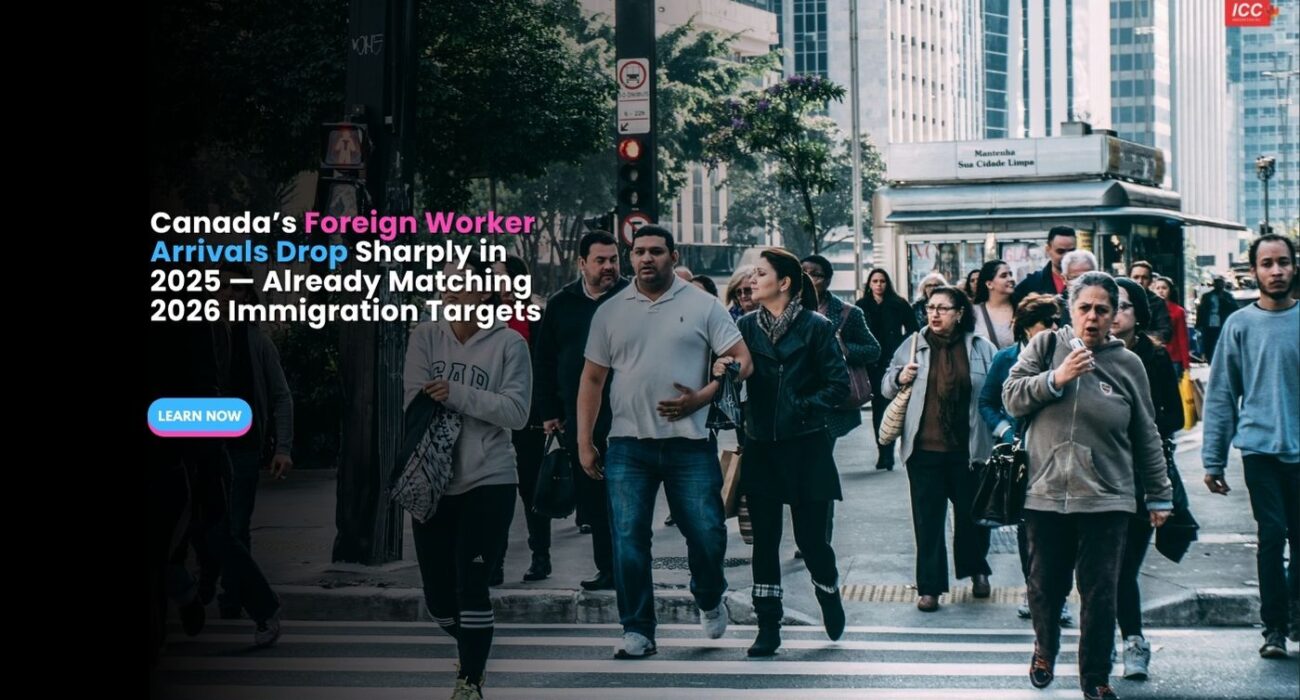Canada’s labour market is undergoing a major shift in 2025, with new data showing that foreign worker arrivals have slowed dramatically. According to recent figures, Canada is on pace to welcome only 202,923 foreign workers this year — over 100,000 fewer than the federal government’s target of 367,750.
This steep drop signals that the federal government’s policies designed to reduce temporary resident levels are taking effect much faster than anticipated.
In fact, the current pace of arrivals is almost identical to the 2026 foreign worker target of 230,000 — and even slightly below what Immigration, Refugees and Citizenship Canada (IRCC) planned for next year.
Foreign Worker Numbers in 2025: How Big Is the Gap?
The federal government’s 2025–2027 Immigration Levels Plan laid out ambitious goals for worker admissions:
-
82,000 workers via the Temporary Foreign Worker Program (TFWP)
-
285,750 workers through the International Mobility Program (IMP)
-
367,750 total foreign workers for 2025
But between January and August 2025, Canada only welcomed:
-
43,315 TFWP workers
-
111,200 IMP workers
-
154,515 total workers
By projecting these eight months against last year’s seasonal patterns, Canada is expected to end the year with:
-
59,679 TFWP arrivals
-
143,244 IMP arrivals
-
202,923 total foreign workers
That leaves a shortfall of 164,827 workers compared to the federal target — a significant gap.
Why Are Foreign Worker Admissions Dropping?
Canada introduced several policy changes in 2024 and 2025 to reduce temporary resident levels to 5% of the national population by 2027. These measures are aimed at easing pressure on housing, rental demand, and public services.
Key policy changes affecting foreign workers include:
-
A moratorium on low-wage LMIA processing in regions with unemployment of 6% or higher
-
Higher wage thresholds for high-wage LMIA applications
-
New language test requirements for Post-Graduation Work Permits (PGWPs)
-
Program restrictions limiting PGWPs for students outside eligible fields
-
Tightened rules for Spousal Open Work Permits (SOWPs)
-
Stricter guidelines for Intra-Company Transfers (ICT)
-
Rolling back pandemic-era policies that allowed visitors to switch to work permits more easily
-
Multi-year, reduced targets for IMP and TFWP starting in 2025
These changes are contributing to a dramatic drop in new work permits — especially under the IMP, where 2025 arrivals are projected to fall over 142,000 short of the target.
What Does This Mean for Canada’s Labour Market?
With fewer foreign workers entering Canada, the country is already seeing early economic impacts.
1. Housing Pressure Is Easing
Reports from TD Bank and CMHC indicate that the slowdown in temporary resident growth has contributed to:
-
Reduced rental demand
-
Slower rise in rental prices
-
Negative rental price growth in major cities such as Toronto and Vancouver
2. Job Market Adjustments Are Emerging
A smaller temporary workforce has also been linked to:
-
Decreased competition for entry-level and service-sector jobs
-
Slight reduction in youth unemployment levels
While long-term outcomes are still unknown, economists expect continued impacts on sectors heavily dependent on temporary foreign labour, including hospitality, food services, caregiving, and agriculture.
International Student Arrivals Are Also Falling
IRCC data shows that international student arrivals in 2025 are also trending toward 2026 target levels, suggesting that both workers and students are being affected by policy tightening.
This means Canada will likely see fewer temporary residents overall, aligning with the government’s population-management strategy.
How ICC Immigration Can Help You Build a Secure Future in Canada
With Canada tightening pathways for temporary residents, navigating the immigration system has become more complex than ever. Choosing the right pathway is now crucial to avoid delays, refusals, or risky decisions like making an unnecessary asylum claim.
That’s where ICC Immigration can help.
✔ Permanent Residency Applications
Whether you qualify for Express Entry, Provincial Nominee Programs (PNPs), or other economic pathways, ICC ensures your file is complete, accurate, and optimized for success.
✔ Work Permits & Study Permits
If you aim to work or study in Canada, ICC helps you select programs that provide strong long-term PR potential and meet the latest government rules.
✔ Family Sponsorship
Reuniting with family in Canada is a major step toward permanent stability. ICC guides you through the entire Spousal, Child, or Parent sponsorship process.
✔ Expert Legal Advice
Canadian immigration policies change frequently. ICC’s regulated experts ensure you meet all updated requirements and avoid costly mistakes.
Why Choose ICC Immigration Instead of Risky Alternatives?
Some individuals consider the asylum route for status — but this path is uncertain, slow, and often ends in refusal if not based on genuine protection needs.
ICC Immigration helps you pursue stable, legal, and approved pathways that offer:
-
Security
-
A predictable future
-
A clear road to Permanent Residency
Whether you’re already in Canada or planning your journey from abroad, ICC provides the professional guidance you need to build a successful future in Canada.
Final Thoughts
Canada’s sharp decline in foreign worker arrivals shows how dramatically immigration policies have shifted. With fewer work permits issuing and more restrictions in place, it’s more important than ever for newcomers to choose the right immigration strategy.
If you want trusted, professional guidance on how to secure your status and build your life in Canada, ICC Immigration is here to help every step of the way.




